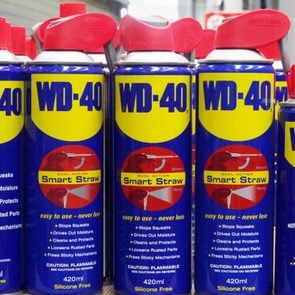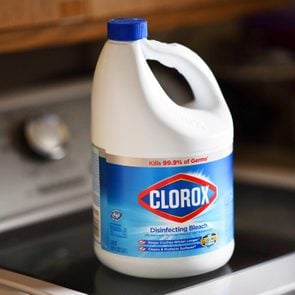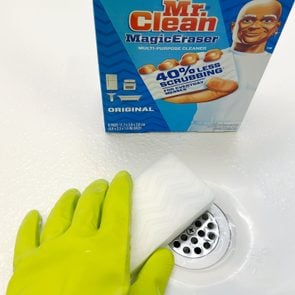10 Ways to Clean with Denture Tablets to Make Chores Easier
Updated: Apr. 17, 2024
Not only can you clean with denture tablets—but it's also a really good idea! Here's why.
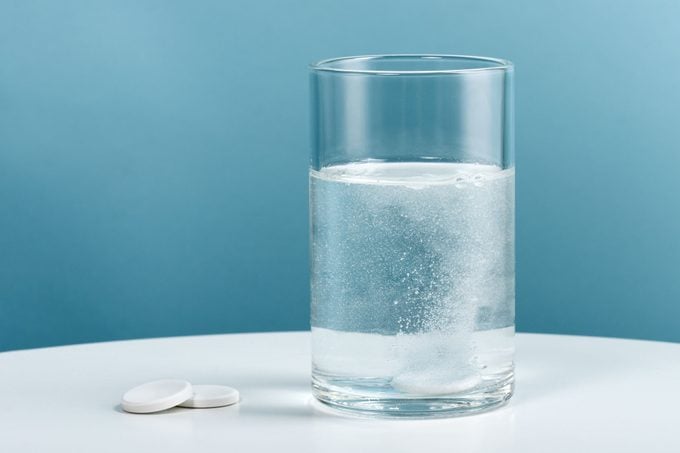
Clean with denture tablets? You heard that right. They don’t just keep false teeth spotless and sparkling—they can also be used to de-gunk, de-grease and de-grime more than a dozen items in the kitchen, the bath and many spaces in between. The primary ingredient in most denture tablets is sodium bicarbonate (aka baking soda), which is well known for its deodorizing and cleaning capabilities.
“Denture tablets are designed to fizz and dissolve in water, which activates the ingredients evenly throughout the solution,” says Brandon Pleshek, a third-generation janitor and the creator of Clean That Up. “This effervescence can penetrate nooks and crannies, making it effective for cleaning intricate items or areas that are hard to reach.”
Finding a relatively hands-off solution for a wide variety of common cleaning challenges is a win-win in my book. Plus, since it’s natural and made for your mouth, you don’t have to worry about breathing in or ingesting harsh chemicals. A definite bonus!
But does this cleaning method work—really? I grilled Pleshek and cleaning expert Sharon Garcia, founder of Next Level Cleaning in California, about their favorite uses for the tabs, and then bought myself a box and went to town cleaning neglected items around my house. After nearly 15 years as a cleaning editor, I’ve decided to make room in my cleaning caddy for these handy little helpers. They really do work, though you’ll definitely want to know a few tips and tricks to maximize their efficiency and cleaning power, especially when it comes to stain removal. Here are 10 items to try them on for yourself.
Get Reader’s Digest’s Read Up newsletter for more cleaning, tech, travel, humor and fun facts all week long.
About the experts
|
1. Pots and pans
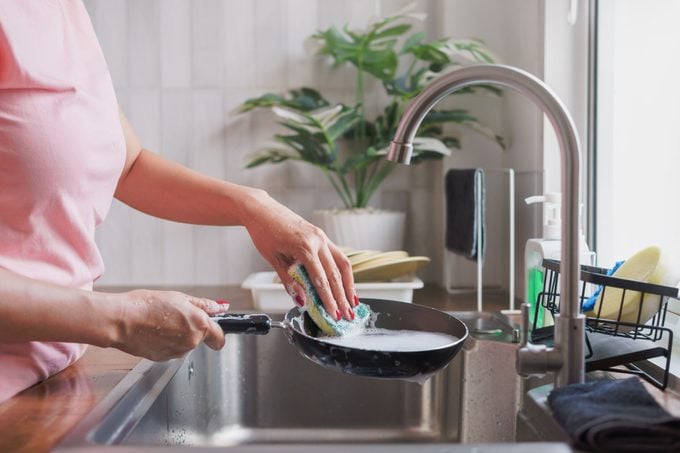
If baked-on food is your struggle, cover the bottom of your pots and pans with at least half an inch of warm water and drop in a denture tablet. (Use two if you’re dealing with particularly gunked-on grime.) Let sit up to overnight, and then wash as usual. The bubbly pre-soak will help lift any stuck-on stuff without much elbow grease.
I tried this with a cookie sheet that sat in the oven below my Easter ham to catch dripping glaze that then baked itself into the cookie sheet pretty well. I let the denture tablet and water sit on the cookie sheet overnight, and the next morning, I was prepared to chisel the debris away. But when it came time to scrub, I had no issues—it washed right off!
2. Vases, coffee pots and tea kettles
I love freshly cut flowers, sure. But the residue that they leave behind after a week in the vase is typically anything but rosy. Plus, the narrow neck design of some vases makes it impossible to reach in and scrub them clean. Instead, fill your vase with warm water, drop in a denture tablet and let it sit for 20 minutes. Warm water will encourage the solid tablet to dissolve and start working its magic. Drain, then rinse clean. Use the same method to remove buildup from coffee carafes, tea kettles and the like.
| ♦ Pro tip |
| Obviously you can’t control the water temperature in certain places, like in a toilet bowl (see below), but when you can, the pros suggest using warm water with denture tablets. |
3. Mugs
Ceramic or china mugs can develop a ring of discoloration from coffee or tea. (Hey, so do dentures, right? Dentures are typically made from porcelain or resin, so it makes sense that they would also work on mugs of a similar material.) To clean with denture tablets for this trick, drop half a tablet within the mug filled with warm water and let it sit for at least 20 minutes to lift the stain before washing as usual.
While I’m not a tea drinker myself, I bought a set of china mugs at a garage sale recently, and a few had dark staining on the interior. A 20-minute soak with a denture tablet followed by a swipe with a soapy sponge got rid of the discoloration and totally revived my thrifted purchases.
4. Reusable water bottles and travel mugs
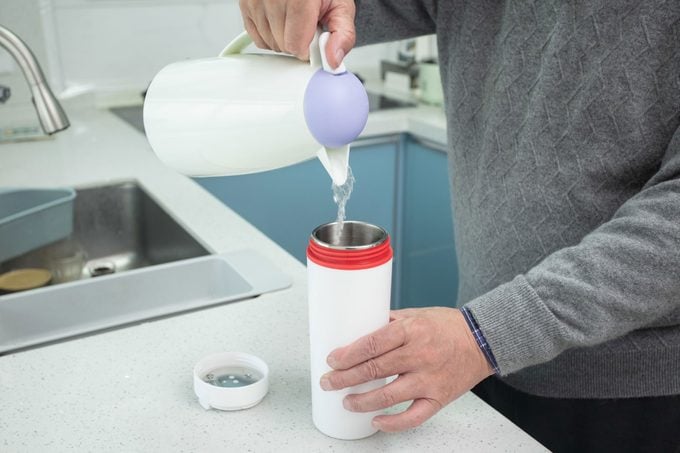
These always-by-our-side containers may quench our thirst from dawn until dusk, but after a long day (or few days forgotten on the desk), they can get a bit … funky. Eliminate bacteria, odors and any lingering film within these vessels (which are often not dishwasher-safe) with the help of a denture tablet. Break one in half, drop it into the container and fill it with warm water. Let sit for at least 20 minutes, and then wash your reusable water bottle as usual.
5. Food storage containers
Leftovers can leave a greasy film or discoloration on plastic and glass storage containers (hello, spaghetti sauce). Eliminate these stubborn stains by filling the container with warm to hot water and a denture tablet. Let soak for about half an hour before washing as usual.
I was hopeful that this would be the miracle cure for my red-tinted Tupperware, but unfortunately the spaghetti sauce seems to have baked into the plastic after multiple trips through the dishwasher. In this case, the stains were stronger than the denture tablets, so I’d suggest tackling a stain as soon as you notice it, since more set-in discoloration may not budge.
6. Toilet bowls
Depending on the severity of the buildup in your toilet bowl, drop two to three tablets directly into the bowl and let sit for at least 20 minutes. Garcia recommends making this your first step in cleaning the bathroom: Drop in the tablets, move on to clean the rest of the room and then come back to the toilet at the very end. Give it a quick swipe with your toilet brush, flush, and you’re done.
Well, almost. One thing I realized when testing this for myself is that the denture tablets only help loosen and lift up whatever buildup is below the water in your toilet bowl. In my house, I get a pink discoloration from our water that runs down from the very top of the bowl, just below the seat. When I use my typical toilet-bowl cleaning method, I squeeze the cleaner’s blue goo around the top rim of the bowl and scrub it in with a toilet brush to release those stains. With just denture tabs, the pink streak remained. Even if you don’t have this problem, you’ll want to make sure to clean the entire bowl with your brush, not just the lower part.
7. Toothbrushes
While you should still change out your toothbrush every three months or so, you can give it a refresh between swaps with the help of denture tablets. In their intended function, denture tablets help remove bacteria and stains—and they can do the same for your toothbrush. Plus, they typically have a minty flavor that adds to the fresh feeling. Drop the toothbrush head down into a glass filled with warm water and half a denture tablet. Let it sit for about half an hour, then rinse before brushing again.
8. Tubs and sinks
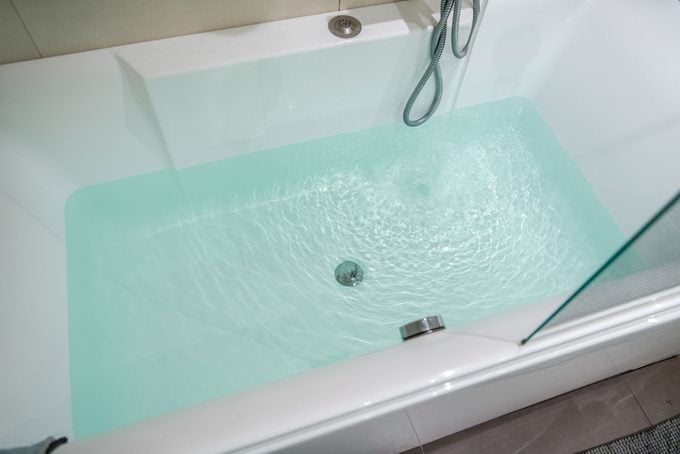
Hard water stains or soapy buildup on porcelain or ceramic should easily loosen after a soak with these effervescent tablets. Fill your tub or sink 1/3 of the way with warm or hot water, and drop in some denture tablets (say, two to three for a sink and four to five for a full-size tub). Let the solution sit for at least 30 minutes before coming back to drain, and then scrub the surface with your cleaner of choice.
When I tried this on my enamel bathtub, I noticed the discoloration disappear as I gave the surface a light scrubbing while the water drained out. But don’t clean with denture tablets if you have natural stone surfaces like marble, granite or limestone, warns Pleshek: “The acidic nature of some tablets could etch or dull the finish of these surfaces.”
9. Trash cans
Lingering odors in your garbage can? Freshen it up by taking it outside or placing it in a bathtub, covering at least the bottom of the container with water, and dropping one to two tablets inside. Let the tablet dissolve and sit for about 30 minutes before rinsing.
I tried this with my kitchen recycling bin, which tends to collect a sticky (and sometimes smelly) residue of apple juice and other liquids at the bottom. I brought it to my tub, filled the container with about three inches of warm water, dropped in two denture tablets, and let it sit while I finished up dinner. Then I came back, emptied it out and let the container dry. While it still looks like a dingy trash can, it (thankfully) no longer smells or feels sticky like one!
10. High-chair and stroller components
In my own personal testing, I was most impressed with how well denture tablets helped me clean the gunk out of my 15-month-old son’s high chair. As he figures out how to feed himself, a lot of his food ends up in spots other than his mouth, including in the small crevices of the high-chair buckle and ground into the straps. As a test, I removed the center buckle and left the shoulder straps to compare afterward.
I dropped the buckle and its attached strap into a cup filled with hot water and a denture tablet. I let it soak for about an hour before removing and rinsing the buckle. After letting it dry, I replaced the buckle—and it looked good as new (especially when held up against the shoulder straps, which are next on my to-be-cleaned list). From now on, I’ll be using this method on all of the removable elements of my kids’ car seats and strollers as well.
| ♦ Pro tip |
| Some denture tablets may contain a bleaching agent, which could alter fabric colors, so test the solution on an inconspicuous part of your item first if you’re concerned. |
Why trust us
At Reader’s Digest, we’re committed to producing high-quality content by writers with expertise and experience in their field, in consultation with relevant, qualified experts. For this piece on how to clean with denture tablets, Stephanie Sisco tapped her experience as a longtime home and cleaning editor, and then Ann Russell, TikTok’s “cleaning auntie” and the author of How to Clean Everything, gave it a rigorous review to ensure that all information is accurate and offers the best possible advice to readers. We also relied on reputable primary sources, including cleaning and health experts and reputable organizations. We verified all facts and data and backed them with credible sourcing, and we will revisit them over time to ensure they remain accurate and up to date. Read more about our team, our contributors and our editorial policies.
Sources:
- Sharon Garcia, owner of Next Level Cleaning Services and creator of Sharon Cleans Everything; phone interview, March 6, 2024
- Brandon Pleshek, third-generation janitor and creator of Clean That Up; email interview, March 11, 2024


